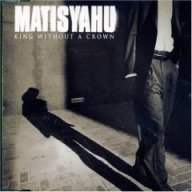3-D Review: "King without a Crown"
3-D Review: "King without a Crown"

Background/summary: Matisyahu Miller is a bit of an anomaly: a Hasidic Jew who also happens to be a dancehall/reggae/rap star. Over the past year his music has garnered strong airplay on college radio, but mainstream radio is taking notice. The song is currently #9 on Billboard’s Modern Rock charts, while the album Live at Stubbs is at #32 on the album sales charts. MTV and mtvU both have the video in heavy rotation. Matisyahu’s popularity is expected to grow as his new album Youth is scheduled for release in March, featuring a new version of the song. He is also scheduled to play on both the Bonaroo and Coachella tours this summer alongside the likes of Tool, Franz Ferdinand, Tom Petty, Beck and Radiohead. We can also expect his popularity to rise among Christian music listeners as he is featured on POD’s new album Testify.
Discover: What is the message/worldview?
- This song explores the relationship between God and man in a style similar to that in the book of Psalms. Matisyahu sings praise to God, recognizing Him as the source of his being and deliverance.
- In the chorus he sings of desiring the coming of Moshiach (Messiah), recognizing Him as coming from God.
- He refers to God in the traditional Jewish way, either as G_d or Hashem, recognizing God’s holiness and sovereignty.
- Having come from a background of drugs he sings, “Me no want no sinsemilla, that would only bring me down, burn away my brain no way my brain is too compound, Torah food for my brain.” He recognizes that the Word of God is what he needs over sinsemilla, a highly potent form of marijuana.
- The newer 2006 version of the video features scenes of a teenage boy walking lonely and sad through the city streets. This is counterbalanced with lyrics like “Strip away the layers and reveal your soul, got to give yourself up and then you become whole, you’re a slave to yourself and you don’t even know.”
Discern: How does it stand in light of the biblical message/worldview?
- Most of what is found in the song and video is very much in line with scripture. Throughout the book of Psalms we see constant references to thirsting for God (Psalm 42). As beings created to be in relationship with God, all of us yearn for that connection whether we know it or not.
- The story of the prodigal son (Luke 15) talks about being lost and then found. This song illuminates that theme, recognizing that we can only find true fulfillment once we return to our Creator.
- While Matisyahu, as a Hasidic Jew continues to seek the coming of God’s chosen One, both the Old and New Testament point to Christ as the Messiah who has already come.
- Throughout both Testaments we find warnings against pride, and the need to turn our hearts over to God and put Him first.
Decide: What do I do with it?
- As Matisyahu’s popularity increases, his music and videos can become powerful teaching tools. The fact that he is doing so well in the music mainstream despite his unique appearance, musical style and lyrical content, indicates that today’s youth are increasingly interested in spiritual things.
- We live in a culture of smorgasbord spirituality where our teens create their own faith based on Christianity and elements from other religions they find attractive. Because of Matisyahu’s work with POD, some may see this as validation of his faith. We need to help our kids discern between the truths of Christianity and the worldviews of other faiths.
- While Matisyahu still seeks Messiah, we can point our kids to Old Testament prophesies that point to the New Testament Gospel of Christ as God’s only Son.
- We can use Matisyahu’s increased popularity to focus on his lyrics and instill in our teens a similar desire and love for God and His Word.
- Matisyahu recognizes that only God can fill the void in our lives, while drugs and other things only leave us feeling empty. We can communicate this truth to a generation desperately seeking to fill their void with all that the world has to offer.
0 Comments:
Post a Comment
<< Home